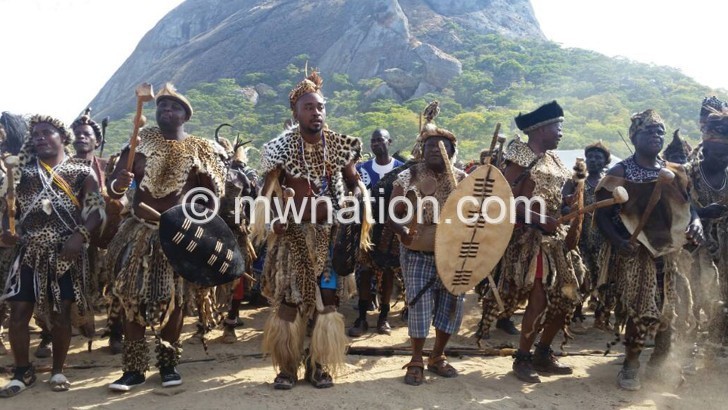M’mbelwa IV’s legacy preserved in museum
In February 2013, Edingeni Royal Headquarters in Mzimba was soaked in tears. From the young to the old, all wept the death of Inkosi ya Makhosi M’mbelwa IV—a pillar not for the Jere royal family only, but for the entire Ngoni ethnic tribe.
Five years later, his spirit roared back to life at the same Edingeni Headquarters where a mausoleum was unveiled in his honour.

The unveiling ceremony was not all about tears and sorrow. Rather, it was a moment to celebrate the life of the departed chief whose legacy has been preserved in the museum which chronicles his life as M’mbelwa IV.
“His spirit will live on forever through this museum,” says Mzimba Heritage Association (Mziha) secretary Aupson Thole.
Thole says M’mbelwa IV is remembered as a cultural icon who united all ngonis in Southern Africa.
“He worked on uniting all ngonis from Malawi, South Africa, Zambia, Zimbabwe and Tanzania,” he says.
He explains that M’mbelwa IV spearheaded the establishment of Umthetho Cultural Festival and endorsed Hora as the venue.
“He made it clear that Umthetho is for uniting all Ngonis from Malawi, South Africa, Zambia, Zimbabwe and Tanzania,” he says.
Thole says the first team from these countries to attend the event was in 2012.
“Despite his death, we continue holding the event to sustain his dream,” he says.
The cultural event has grown as a major festival amongst the Ngoni in Africa as it hosts Inkosi ya Makosi Mpezeni from Zambia, Inkosi ya Makosi Zulu Gama from Tanzania, representatives of the Mandebele ethnic group from Zimbabwe and those from KwaZulu Natal in South Africa.
“But we are yet to fulfil his dream as we continue searching for other ngonis in Kenya and other countries,” says Thole.
In 2000, M’mbelwa IV set up the Mzimba Heritage Association to spearhead the preservation and promotion of Ngoni cultural heritage.
Thole says M’mbelwa IV was the “life patron” and “encouraged us to be nonpartisan”.
Apart from that, M’mbelwa IV is also remembered for leading his people in various cultural events, including one at Elangeni in 1988 and the other at Mabiri in the district.
“Before the Ngoni settled at Ufipa, they first settled at Mabiri for five years. The festival which M’mbelwa led was first celebrated in 1957 with Inkosi ya Makosi M’mbelwa II when Sir Robert Armitage was governor,” he says.
Born Zongendawa Jere in 1954, the Ngoni Chief was installed as Inkosi ya Makhosi M’mbelwa IV in February 1984 by Paramount Chief Mpezeni of Zambia at his home Village of Edingeni in Mzimba.
He has led his subjects during various political dispensations, including the one-party regime of Kamuzu Banda, the democratic era of Bakili Muluzi, Bingu wa Mutharika and Joyce Banda.
During his reign, M’mbelwa IV served as the chairperson for the Malawi Chiefs Council, chairperson for chiefs in the Southern African Development Community (Sadc), chairperson for the Malawi Broadcasting Station (MBC), the Tobacco Control Commission and the Roads Authority.
On the international stage, he has represented government in Namibia, United Nations headquarters and also visited the Queen’s Palace in the United Kingdom.
Despite such portfolios, Thole describes M’mbelwa IV as someone who was “humble and would interact with everyone”.
Thole thanks the incumbent M’mbelwa V for bestowing all honour upon the deceased with the mausoleum which also has a museum to display his life.
“M’mbelwa V had all the power to delegate the responsibility of constructing the mausoleum to his subjects and all the people of Mzimba.
“But he took it upon himself to do it. This is an example to us on how we need to respect our departed relatives,” he says.
On behalf of M’mbelwa IV’s friends, Dean Lungu said the departed chief was a humble person who “did not show that he was from a royal family”.
“He treated us as his friends. He treated us his a people. He was a man that was indeed exemplary to Mzimba people and to people in Malawi in general.
“He is a departed hero to us. May the Lord continue blessing his soul and may his soul rest in eternal peace,” he says.
M’mbelwa IV died in February 2013 at Mwaiwathu Private Hospital in Blantyre after a long bout with diabetes.
He left behind four children. His first-born son Mkhosi Jere was enthroned in 2014 as M’mbelwa V.





